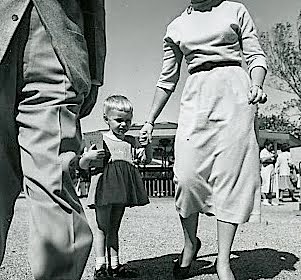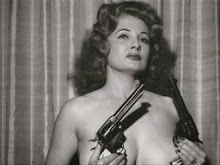
Although I'm going to try to hand the papers back this Wednesday, I hope I can put everyone's mind at rest by saying that this batch of papers was quite good: most everyone exhibited clear engagement with the ideas we've been working over in class. I wanted this first assignment to give you a kind of experimental space to "play" with the theory we've been discussing, to bring it into the space of reading fiction and perhaps discover new ways to think about narrative and its place in our lives.
I know some students felt flustered by the lack of conventional essay guidelines. Clearly, I didn't want students to simply reproduce the ideas they'd read or the discussion we've had. That can be a tall order when much of your education has focused precisely on those skills: mastery of a formula and its accurate reproduction are useful processes for some areas of academic study, if not all. And that kind of "learning" is pretty much where we all begin our earliest lessons: mimicking the sounds cooed to us by parents, following their instructions help us become a "big boy" or a "big girl."
But, necessary as this kind of mastery of social convention is for the infant, it is a far cry from learning to be able to critically reflect on those conventions, on our lives and on our adult selves. Learning how to consciously use ideas is the empowering conceptual break common to both pedagogy and psychoanalysis.
Freud once wrote that "The discovery of the unconscious and the introduction of it into consciousness is performed in the face of a continuous resistance on the part of the patient. The process of bringing this unconscious material to light is associated with pain, and because of this pain the patient again and again rejects it...[however] if you succeed in persuading him to accept, by virtue of a better understanding, something that up to now, in consequence of this automatic regulation by pain, he has rejected, you will then have accomplished something towards his education."
Though all of your papers had varying strengths, it was clear to me that there was still resistance (and most of it probably unconscious) to push beyond the usual English paper assignment. Many papers began by rehearsing information about Freud or about psychoanalysis or about Henry James that was completely unnecessary for this paper. I think we can take it as a given that Freud and Henry James are "famous writers" and other such generalities. Papers which began this way usually didn't stray too far from simple "book reports" (rehearsal of plot) or comparison/contrast essays.
Likewise, many students exhibited a great deal of anxiety about the assignment both before and after. I'm not so much interested in all of this in terms of "correcting problems;" I am interested, though, in the roots of such fear and how it can obstruct learning. The last time I taught this course, a student once linked "the Uncanny" with students' performance anxiety: grounding it both in the fear of not seeing (not understanding things correctly) and the fear of being seen (looking like an idiot in front of the teacher/class). I think that the repression trauma that produces the infant as functioning subject certainly has a clear analogy in our current educational structures.
But, back to the papers. Here are a few interesting and useful bits from the papers on "The Turn of the Screw:" I think there are some good ideas here for further work in future papers. I particularly want to turn your attention to the way these students touched on the role of the reader: that the novel was not just a story about the Uncanny, but an experience of it.
Andrew began his paper with a frank admission of his anxiety over the assignment: not being sure he understood the concepts under discussion, not being sure he understood the novel, not being sure how to draw both together, and so on. But, he also related how this frustration with "not knowing" let him to rethink "knowing" itself: "In class we discussed the calculated ambiguity of the novel, so I realized my duty to inject my own perceptions into the stories' blurred parameters....I no longer looked for answers, but created them with Freud as my guide." Andrew expressed how this freed him up to explore areas of the narrative he previously hadn't considered; finally deciding to read "The Turn of the Screw" as a kind of allegory about control (though the use of the term "allegory" is mine not Andrew's). The rest of his paper explored the Governess being "haunted" by her lack of control within the framework of being put in sole control. I think some of Andrew's ideas can be profitably extended to both H and Fun Home, both of which foreground the relations between children and parents.
Bar, too, focused on the relation between knowledge and "the Uncanny." His starting point was that of Freud's definition: the Uncanny doesn't disturb through novelty, but by familiarity, albeit the unfamiliar aspects of what is assumed to be "well known." But Bar pushes this even further: "The uncanny does not create disquiet simply because it introduces a new, unknown aspect to something which was perceived to be known. It is that which exposes everything to be necessarily unintelligible. The uncanny does not lie solely in the story, but rather is an effect of the reading itself. The experience of reading the story in itself reveals to the reader that they in fact don't have anyway of knowing anything." The rest of his paper follows up the "funhouse" effect of the multitude of doubling and doubles found throughout "The Turn of the Screw." Everything that seems "objective" is "subjective," everything the seems clear is revealed to be opaque, everything seems to fold into its opposite: The Good Governess and The Bad Jessel are obvious mirror images. Bar talks about an "Inception"-like chain reaction produced by the Uncanny: an unending opening up of ambiguity where once there was certainty, a chain of possible readings and interpretations which constantly undermine each other. Bar seems to take the Uncanny to an almost nihilistic point---can we really know anything?
Tehreem focused most of her discussion on the Governess and her uncanny experience of the ghosts. She points out that this uncanny quality is an effect not of their "supernatural" status (spirits of the dead!) but instead of their narrative function as doubles. These "ghosts" have returned because they are the repressed: they represent not only the individual repressed desires of the Governess (sexual in nature), but also the larger repressed behaviors of society itself (based in class divisions).
Quelsy started with a discussion of "The Sandman" and extended that story's recurring motif of eyes/sight into an examination of the dynamic of the seen/unseen in "The Turn of the Screw." He compared the ghosts' desire to be seen to that of the Governess. Both crave a recognition; in the case of the Governess, she want to be "seen" by the Master as fulfilling his desires, but his desires can only be fulfilled be her remaining "unseen" (not contacting him). He also points out how the frustrations of the characters in the text mirror the frustrations of the reader with the text---what is it that the reader "sees?"
Caroline began by thinking about the convention of the "ghost story:" a narrative which usually entertains by scaring us in sometimes unpredictable, sometimes predictable, but always "safe" ways. She finds "The Turn of the Screw" parting ways with the traditional ghost story because its distressing effects are not found in the "unusual" elements of the story (the ghosts, which aren't particularly scary in a conventional way) but in the disquiet of the "everyday:" things taken for granted that are revealed to be less familiar, less understood, than initially supposed. And worse, the possible impossibility of ever being able to know with certainty: the children, innocent or corrupt? the Governess, careful or neglectful of the children? Caroline ended her paper with how this ambiguity rebounds on the reader: "scaring" us with this lack of certainty rather than showing us some "certain" evil.
These are only a few examples of the work everyone did in their papers. But they give a glance at the differing ways people approached the assignment and differing aspects of both the novel and the concept of the Uncanny that students focused on. One carry over from this assignment to the next paper might be to again think about the position of the reader: how a text might "force" us to read it in a certain fashion, and what the results of that are on the reader. And also, what Freud's texts teach us about reading: how do we "interpret" the stories we encounter---not just in this class but also in our lives in general. As I think most students concluded at some point in their papers, a final certainty seems to be off the table. But what about reading less as a way to find answers and more as a way to construct (new, useful) questions?


























































No comments:
Post a Comment